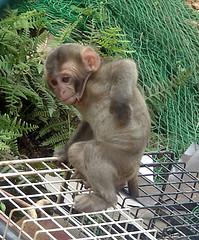 The Hundredth Monkey is the name of a new myth. Off the coast of Japan, scientists have been studying monkey colonies. The monkeys out of trees to collect the sweet potatoes scientists left them on the beaches, to collect them and eat them filled with sand. One day a young female, Imo, began to wash sweet potatoes in the sea before eating. Imo later began to teach their parents and relatives to do the same, maybe the sand bothered to chew. At first only the adults followed suit, and later do almost the entire colony. One day, observers saw that all the monkeys on the island were washing potatoes. The most fascinating thing was that when this change occurred, the behavior of all monkeys in the rest of the islands changed, all washed their sweet potatoes, despite the fact that colonies of monkeys had no direct contact between them.
The Hundredth Monkey is the name of a new myth. Off the coast of Japan, scientists have been studying monkey colonies. The monkeys out of trees to collect the sweet potatoes scientists left them on the beaches, to collect them and eat them filled with sand. One day a young female, Imo, began to wash sweet potatoes in the sea before eating. Imo later began to teach their parents and relatives to do the same, maybe the sand bothered to chew. At first only the adults followed suit, and later do almost the entire colony. One day, observers saw that all the monkeys on the island were washing potatoes. The most fascinating thing was that when this change occurred, the behavior of all monkeys in the rest of the islands changed, all washed their sweet potatoes, despite the fact that colonies of monkeys had no direct contact between them.
This would come to endorse the confirmation of the morphogenetic field theory, the hundredth monkey, the monkey would be made anonymous tip the balance of culture, one whose behavior change marked the critical number of monkeys that had changed their behavior. It is an allegory of New Hope was offered to people who have been working to change themselves and save the planet, wondering if their individual efforts will be used for something, analyzed scientifically proven this story seems like all our behaviors may change the rest. The change from one species could occur through a change of individuals who, one by one, do something new every day, who will be the architect of change do not, will that lead to new paradigms. The more people change their habits, the easier it is for everyone to reach a harmony of humanity, until finally one day someone will be the hundredth anonymous, and all have, and in fact, changed. For those who need to change the world and have the faith and conscience who are able, this theory encourages them, they get power and evokes them what moves them and leads them to be deeply themselves. Apart from being motivated to make a change on the outside is actually a metaphor for what happens inside each of us.
If we repeat a behavior motivated by an attitude or principle sufficient number of times, in the end we become what we do. Myth version of the hundredth monkey Ben Keyes Jr. adapted the book "The Gods of every Man" of the Jungian analyst Dr. Shinoda Bolen. Sowing even thought, reap an act. Sow an act, reap a habit. Sow a habit and you reap a character. Sow a character and you reap a destiny …
